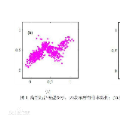A long-standing challenge for a robotic manipulation system operating in real-world scenarios is adapting and generalizing its acquired motor skills to unseen environments. We tackle this challenge employing hybrid skill models that integrate imitation and reinforcement paradigms, to explore how the learning and adaptation of a skill, along with its core grounding in the scene through a learned keypoint, can facilitate such generalization. To that end, we develop Keypoint Integrated Soft Actor-Critic Gaussian Mixture Models (KIS-GMM) approach that learns to predict the reference of a dynamical system within the scene as a 3D keypoint, leveraging visual observations obtained by the robot's physical interactions during skill learning. Through conducting comprehensive evaluations in both simulated and real-world environments, we show that our method enables a robot to gain a significant zero-shot generalization to novel environments and to refine skills in the target environments faster than learning from scratch. Importantly, this is achieved without the need for new ground truth data. Moreover, our method effectively copes with scene displacements.
翻译:暂无翻译




